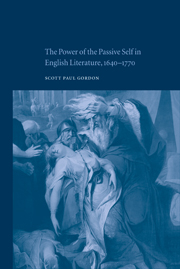Book contents
- Frontmatter
- Contents
- Acknowledgments
- Introduction. “Spring and Motive of our Actions”: disinterest and self-interest
- 1 “Acted by Another”: agency and action in early modern England
- 2 “The belief of the people”: Thomas Hobbes and the battle over the heroic
- 3 “For want of some heedfull Eye”: Mr. Spectator and the power of spectacle
- 4 “For its own sake”: virtue and agency in early eighteenth-century England
- 5 “Not perform'd at all”: managing Garrick's body in eighteenth-century England
- 6 “I wrote my Heart”: Richardson's Clarissa and the tactics of sentiment
- Epilogue: “A sign of so noble a passion”: the politics of disinterested selves
- Notes
- Bibliography
- Index
2 - “The belief of the people”: Thomas Hobbes and the battle over the heroic
Published online by Cambridge University Press: 22 September 2009
- Frontmatter
- Contents
- Acknowledgments
- Introduction. “Spring and Motive of our Actions”: disinterest and self-interest
- 1 “Acted by Another”: agency and action in early modern England
- 2 “The belief of the people”: Thomas Hobbes and the battle over the heroic
- 3 “For want of some heedfull Eye”: Mr. Spectator and the power of spectacle
- 4 “For its own sake”: virtue and agency in early eighteenth-century England
- 5 “Not perform'd at all”: managing Garrick's body in eighteenth-century England
- 6 “I wrote my Heart”: Richardson's Clarissa and the tactics of sentiment
- Epilogue: “A sign of so noble a passion”: the politics of disinterested selves
- Notes
- Bibliography
- Index
Summary
Writers such as Hooker, Perkins, Cotton, Crisp or Cromwell treat universal self-interest as a given of the fallen world. Man's will, corrupted by the fall, cannot choose worthily without divine help. “It is impossible that Man, mere fallen Man,” Mandeville's Fable of the Bees (1714–29) claims, “should act with any other View but to please himself.” Denying that, unprompted, individuals could choose virtuous actions, these writers deploy what I have called the passivity trope to imagine a subjectivity which allows individuals to believe that their every action is not self-interested. Of course the assumption of universal self-interest pervades discourses other than those founded on the doctrine of original sin. Thomas Hobbes's articulation of this position so shocked his contemporaries that they installed him, permanently, as its most prominent advocate. “Of the voluntary acts of every man,” his Leviathan (1651) contends, “the Object is some Good to himselfe.” Confronted with ideologies that require individuals to reject selfish and choose disinterested behaviors, Hobbes insists that “till it please God to give men an extraordinary, and supernaturall grace” (L, 211), we will always choose what we imagine will benefit ourselves. Each individual, Hobbes contends, is little more than a “Tennis-Ball,” controlled rather than controlling, ceaselessly batted about by desires and interests. The generous, disinterested behaviors (demanded by the discourse of the heroic, which, I argue below, Hobbes aims to demolish) are well beyond this passive object's capacities.
- Type
- Chapter
- Information
- Publisher: Cambridge University PressPrint publication year: 2002



